CIA Sponsored Terror, Civil Liberties, Criminalizing Dissent, Gaza, Human Rights, Iran, Iraq War, Supreme Court, Truth to Power
Podcast: Play in new window | Download


Middle East Round Up: Brian Becker
Iran and Gaza are at both at critical and potentially catastrophic junctures. Iran faces new challenges due to because of Donald Trump’s denunciation of the 2015 nuclear deal with Iran and the re-imposition of sweeping sanctions. As well, recent elections in Iraq pushed Iran’s allies in Iraq’s Shia militias–the Popular Mobilization Forces—into second place by nationalist Moqtada al-Sadr.
The element within the Republican Party with deep pockets is the Republican Jewish Committee. They support Netanyahu and his Likud party. The RJC supported both the blowing up of the Iran deal and the move of the Embassy to Jerusalem. Now they support Netanyahu’s crushing of the Palestinians in Gaza.
Iran also risks being diplomatically out-maneuvered. Israel Prime Minister Benjamin Netanyahu was in Moscow recently, aligning his interests in Syria with Vladimir Putin’s. In what is becoming routine coordination, Israel forewarned Russia of its attacks on Iran. Viewed from Tehran, Russia, Iran’s ostensible brother-in-arms in Syria, is more and more unreliable. Its Saudi foes are greatly encouraged by Trump’s offensive.
Guest – Brian Becker, the National Coordinator of the ANSWER Coalition and a leader of the Party for Socialism and Liberation. Brian has been a central organizer of the mass anti-war demonstrations that have taken place in Washington, D.C. in the past decade.
—-
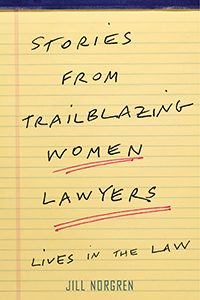

Stories From Trailblazing Women Lawyers
Before the Civil War there were six women lawyers in the entire United States of America. By 1890 there were about 200 and by 1900 about 1000. Women then could not even vote.
It was nearly impossible for a woman to get admitted to a law school or find a job when she graduated. Things did not qualitatively change until the late 1960s and 1970s.
By then, as a consequence of a number of factors including the great civil rights movement, the women’s movement, and the empty law school seats created by drafting men to serve in the Vietnam War, women were able to fight discrimination and win law school admission first by protesting in the streets and then through legislation, court decisions, and the actions of a few forward looking politicians.
Now half of the students in American law schools are women. They are professors in those very same places, indeed, the deans of the two most prestigious law schools in America, Harvard and Yale, are women. They are partners in law firms, hold important positions and governmental agencies, and are judges on the bench.
They have made a difference in the measure of social justice obtained by people in this country by advancing peoples’ and women’s rights in education, healthcare, employment, discrimination, family life, and violence against women.
Guest –Jill Norgren, the author of the just published book Stories From Trailblazing Women Lawyers. Ms. Norgren is Professor Emerita of Political Science at John Jay College and the Graduate Center, the City University of New York. She is the author of several books including Rebels at the Bar.
————————
Afghanistan War, CIA Sponsored Terror, Civil Liberties, Criminalizing Dissent, FBI Intrusion, Gaza, Guantanamo, Human Rights, Military Tribunal, NSA Spying, Political Prisoner, Prison Industry, Prosecution of the Bush Administration, Supreme Court, Surveillance, Targeting Muslims, Torture, Truth to Power, War Resister
Podcast: Play in new window | Download
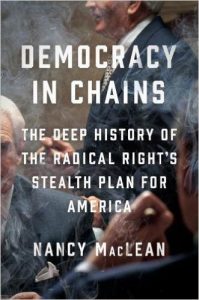
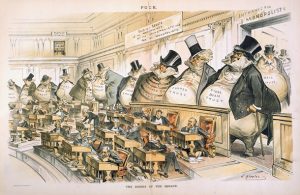
Democracy in Chains: The Deep History of the Radical Right’s Stealth Plan for America
The spectacle of President Donald Trump and the palace intrigue in the White House has served daily to distract people from the political strategy and accomplishments of the radical right, which is taking over the Republican Party.
Over time, the GOP has been transformed into operation conducting a concerted effort to curb democratic rule in favor of capitalist interests in every branch of government, whatever the consequences. It is marching ever closer to the ultimate goal of reshaping the Constitution to protect monied interests. This gradual take over of a major political party happened steadily, over several decades, and often in plain sight.
Duke University Professor Nancy MacLean exposes the architecture of this change and it’s ultimate aim. She has written that “both my research and my observations as a citizen lead me to believe American democracy is in peril”.
Guest – Professor Nancy MacLean, whose new book, Democracy in Chains: The Deep History of the Radical Right’s Stealth Plan for America, has been described by Publishers Weekly as “a thoroughly researched and gripping narrative… [and] a feat of American intellectual and political history.” Booklist called it “perhaps the best explanation to date of the roots of the political divide that threatens to irrevocably alter American government.” The author of four other books, including Freedom is Not Enough: The Opening of the American Workplace (2006) called by the Chicago Tribune “contemporary history at its best,” and Behind the Mask of Chivalry: The Making of the Second Ku Klux Klan, named a New York Times “noteworthy” book of 1994, MacLean is the William H. Chafe Professor of History and Public Policy.
——
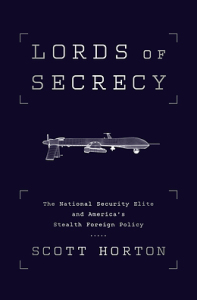
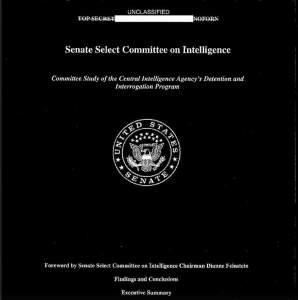
Senate Intelligence Committee Torture Report: Attorney Scott Horton
Guantanamo suicides, CIA interrogation techniques, CIA ordered physicians who violate the Hippocratic oath, are topics of some recent articles by returning guest attorney Scott Horton. Last month, he was on Democracy Now to debate former CIA General Counsel John Rizzo on the question of declassifying a Senate Select Committee on Intelligence report about the agency’s secret detention and interrogation programs. His book Lords of Secrecy The National Security Elite and America’s Stealth Foreign Policy will be published January 2015.
Attorney Scott Horton:
- I think the results flow directly from the media coverage (ABC poll on Torture report)
- Now major publications and broadcasters that hedged using the word torture have stopped doing that. There are only a handful of media sources that won’t do it. NPR being one of them.
- The media also presents roughly twice as much time devoted to people justifying the use of torture techniques to those criticizing it.
- Barack Obama who should lead the push back has gone completely silent. It’s beyond silent he talked about “tortured some folks” making it very casual, and then he said the torturers were patriots.
- I thought it was electrifying reading. 90 percent of it I’ve heard about before and still when you read them in this clinical, plain, highly factual style and things were developed with a continuous flow with lots of background in decision making in Washington at the top and how all this effected what happened on the ground.
- As a consumer of Congressional reports this probably the single most impressive Congressional oversight report I’ve ever seen.
- It’s an excellent example of what the oversight committee should be doing all the time.
- They’re doing this with respect to a program which was essentially or very largely wrapped up by October 2006.
- We’re talking about 8 1/2 years ago.
- They’re only able to do this kind of review in any depth when its historical, not when its real time oversight, that’s disappointing.
- One thing that emerges from looking at these reports and the military reports is that there is a huge black hole which has never been fully developed and explored and that’s JSOC, its the military intelligence side.
- That escaped review within the DOD process and it escaped review in CIA process and its clear that there’s a huge amount there.
- I certainly don’t expect prosecutions to emerge for the next couple of years in the United States, but I see a process setting in that may eventually lead to prosecutions.
- On the one hand we’re seeing a dangerous deterioration in relations with Russia, is an aggressor, which has seized territory in the heart of Europe, is waging a thinly veiled war on one of its neighbors. That is very unnerving to the major NATO powers.
- On the other hand there’s never been a period in the history of the alliance when there is so much upset at the United States.
- That’s come largely from the rise of the surveillance state and the role of the NSA.
- I was looking at this report, and we know that in 2006, there was an internal review that led the CIA to conclude that these interrogation techniques were ineffective and the CIA internally decided to seek a large part of the authority for EIT’s and operation of black sites rescinded.
- Another thing that’s very important here from this report, it tells us that Michael Hayden, George Tenant, Porter Goss and other very senior people at the CIA repeatedly intervened to block any form of punishment of people who are involved with torture and running the black sites.
- That’s important because of the legal document Command Responsibility. The law says when command authority makes a decision not to prosecute and immunize people involved with torture and abuse, that results in the culpability of these crimes migrating up the chain of command.
- I interviewed CIA agents who were involved in this program, and they told me they’ve all been brought out by legal counsels office and told – they may not leave the country.
- That means you’ve got roughly 150 CIA agents, including many people near the top of the agency who can’t travel right now.
- Lords of Secrecy The National Security Elite and America’s Stealth Foreign Policy
Guest – Scott Horton, human rights lawyer and contributing editor to Harper’s Magazine. Scott’s column – No Comment. He graduated Texas Law School in Austin with a JD and was a partner in a large New York law firm, Patterson Belknap Webb & Tyler. His new book Lords of Secrecy The National Security Elite and America’s Stealth Foreign Policy.
CIA Sponsored Terror, Civil Liberties, Criminalizing Dissent, Gaza, Habeas Corpus, Human Rights, NSA Spying, Political Prisoner, Surveillance, Targeting Muslims, Truth to Power, War Resister
Podcast: Play in new window | Download


Reginald Dwayne Betts: Bastards of the Reagan Era
Toni Morrison said, “All of that art-for-art’s-sake stuff is BS. Are you really telling me that Shakespeare and Aeschylus weren’t writing about kings? All good art is political! There is none that isn’t. And the ones that try hard not to be political are political by saying, ‘We love the status quo.’ We’ve just dirtied the word ‘politics,’ made it sound like it’s unpatriotic or something.” “That all started in the period of state art, when you had the communists and fascists running around doing this poster stuff, and the reaction was ‘No, no, no; there’s only aesthetics.’ My point is that is has to be both: beautiful and political at the same time. I’m not interested in art that is not in the world. And it’s not just the narrative, it’s not just the story; it’s the language and the structure and what’s going on behind it. Anybody can make up a story.”
Guest – Reginald Dwayne Betts, an award-winning poet. An honors student and class treasurer in high school, at age 16 he and a friend carjacked a man who had fallen asleep in his car. Betts was charged as an adult and spent more than eight years in prison, where he completed high school and began reading and writing poetry. Betts’s first collection of poems, Shahid Reads His Own Palm won the Beatrice Hawley Award, and his memoir, A Question of Freedom: A Memoir of Learning, Survival, and Coming of Age in Prison, received the 2010 NAACP Image Award. He’s had a Soros Fellowship, a Radcliffe Fellowship and a Ruth Lilly Fellowship. In addition to attending Yale Law school, Betts was appointed by President Obama to the Coordinating Council of the Office of Juvenile Justice and Delinquency Prevention.
—


Jewish Voice For Peace: Deadly Exchange: Ending US–Israel Police Partnerships, Reclaiming Safety
Like the United States, where it’s colonists settled upon, displaced, and controlled the Native American population Israel is also a settler colonialism state. It drove 750,000 Palestinians out when it was just established in 1948 and seized control of the land on the West Bank of the Jordan River and Gaza in 1967 and has militarily occupied and controlled the Palestinian population of nearly 2,000,000 there since. Israel’s settler colonialism experience has provided it with valuable lessons and skills ripe for export to other state powers confronted with challenges of control. Despite the United Nations Security Council condemning Israel it has continued it’s illegal defiant and hostile commitment to expansion.
How does it get away with this? Jeff Halpern in his book “War Against the People” has written that “of the 157 countries with which Israel has diplomatic relations virtually all the agreements and protocols Israel has signed with them contain military and security components.” The government of the United States and Israel have exchange programs that bring together American police, including the New York City police, ICE, the Border Patrol, and the FBI on the US side and soldiers, police and border agents from Israel. We talk with Ari Wohlfeiler one of the leaders of Jewish Voice for Peace. JVP has recently launched a campaign called “Deadly Exchange: Ending US – Israel Police Partnerships, Reclaiming Safety.” JVP has over 200 online supporters and over 60 chapters.
Guest – Ari Wohlfeiler, Deputy Director of JVP. He’s from Oakland, CA and before coming to JVP, he was the Development Director at Critical Resistance, and has worked extensively with grassroots organizations fighting the prison industrial complex.
—————————————
Civil Liberties, Criminalizing Dissent, Gaza, Human Rights, Political Prisoner, Surveillance, Targeting Muslims, Torture, War Resister
Podcast: Play in new window | Download
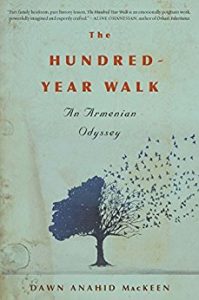
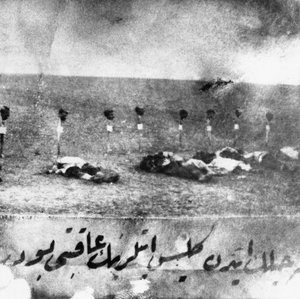
The Hundred-Year Walk: An Armenian Odyssey
April 24 marks the 101st anniversary of the Armenian genocide. Until recently, most Americans never heard of the genocide and rarely hear the individual stories of those who survived atrocities at the hands of the Ottoman Turks. Journalist Dawn Mackeen came to learn the personal account of her grandfather Stepan Miskjian after reading notebooks that he had kept a century ago chronicling his story. She then embarked on a multi-year journey, using her research skills to scour newspapers and archives around the globe to recreate, and then actually retrace, his steps taken 100 years earlier through Turkey and Syria.
She has written an eye-opening book, The Hundred-Year Walk: An Armenian Odyssey. It recounts not only her grandfather’s experience, but those of the approximately 1.5 million Armenians who were tortured and killed in the genocide that began in 1915. As many Armenian genocide survivors did, Dawn’s grandfather escaped just before the members of his caravan with were massacred by disguising himself as an Arab.
Guest – Dawn Mackeen is an award-winning journalist who spent nearly a decade researching and writing her grandfather’s story. Previously, she covered health and social issues for Salon, SmartMoney, and Newsday, where her investigative series on assisted living facilities’ poor care helped prompt legislative reform. Her work has appeared in the New York Times Magazine, Elle, the Sunday Times Magazine (London), the Los Angeles Times, and elsewhere. She lives in Southern California.
—-
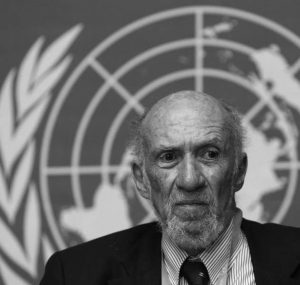

International Law and the State of Israel: Legitimacy, Exceptionalism and Responsibility
At the request of its member states, the United Nations economic and social commission for Western Asia commissioned a report on Israeli practices towards the Palestinian people and the question of apartheid. Apartheid is a crime against humanity under international law. The report found Israel in violation of three international laws. One of them, the 1998 Rome statute of the international criminal court states that “the crime of apartheid means inhumane acts committed in the context of AN institutionalized regime of systematic oppression and domination by one racial group over any other racial group or groups and committed with the intention of maintaining that regime.” The commission report concluded that Israel operates in an Apartheid regime against Palestinian citizens of Israel, Palestinians in East Jerusalem, Palestinians in the West Bank and Gaza, and Palestinian refugees and exiles.The commission made recommendations to dismantle the apartheid regime. In response, Israel and its ally the United States of America had to report rejected and caused the resignation of the head of the commission.
We speak with two anti- apartheid activists. Both have just returned from an important conference on Israel held at the University of Cork, in Cork Ireland. The conference had twice been prevented by pro Israeli forces.
Guest – Richard Falk is the former UN Special Rapporteur on Palestinian human rights and Professor Emeritus of International Law at Princeton University. Since 2002 he has lived in Santa Barbara, California, and taught at the local campus of the University of California in Global and International Studies and since 2005 chaired the Board of the Nuclear Age Peace Foundation.
Guest – Author Joel Kovel, politician, academic, and eco-socialist. He has lectured in psychiatry, anthropology, political science and communication studies. He has published many books including the controversial Overcoming Zionism: Creating a Single Democratic State in Israel/Palestine.
—-
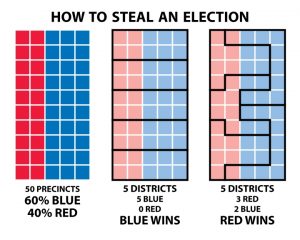
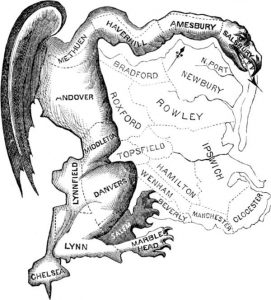
Partisan Gerrymandering In Wisconsin
In a backlash to the 2008 Obama election victory, two years later, in 2010, the Republican Party of Wisconsin won both houses of the legislature and the governorships. The Republicans then redrew the legislative map making it impossible for the Democratic Party to capture a majority of the legislative seats at any time in the decade, no matter how many votes they get. This is called partisan gerrymandering, the process of drawing distorted legislative districts to undermine democracy. Now, in Wisconsin, instead of voters choosing their legislatures, the legislatures choose the voters. As a consequence people in Wisconsin have had their great university system harmed, right to work laws have been enacted wrecking their unions, and there has been substantial environmental damage.
Guest – Professor William “Bill” Whitford who recently retired as a Law Professor at the University of Wisconsin. He is the lead plaintiff in a federal lawsuit against partisan gerrymandering. His cases is likely to be heard in the Supreme Court. In the case Whitford v Gill 12, Wisconsin voters are challenging the constitutionality of the states Republican drawn legislative maps. Heretofore, the Supreme Court has been unwilling to get involved. This case may change that and restore a measure of democracy to a broken system in Wisconsin, and later elsewhere.
—————————————————–
Civil Liberties, Criminalizing Dissent, Crony Capitalism, Gaza, Human Rights, NSA Spying, Political Prisoner, Prison Industry, Surveillance, Targeting Muslims, Torture, War Resister
Podcast: Play in new window | Download

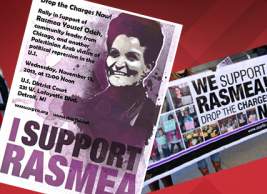
Trial Judge Rules Against 69 Year Old Palestinian Activist Rasmea Odeh
In 1969, when she was a 21 year old college student in Ramallah in the Israeli occupied territories on the West Bank, Rasmea Odeh, a Palestinian woman, was arrested for killing two Israeli University students with a bomb placed in a supermarket. She confessed to the crime and served 10 years in prison, getting out in a prisoner swap. She came to United States 20 years ago, obtained citizenship, and settled in Chicago as a community organizer of immigrant Arab women. Odeh was criminally charged two years ago by the federal government with “unlawful procurement of naturalization.” In her application, she omitted mention of the crime for which she was convicted in Israel. In her defense, she said that she could not remember, that she had post traumatic stress disorder as a result of being tortured in jail for 25 days and forced to sign a false confession. Her expert witness was not allowed to testify as to the PSTD and the torture. The trial judge’s ruling on this was overturned by a Federal Court of Appeals. Last week she agreed to a plea arrangement where she would be stripped of her citizenship and deported rather than face a 5 to 7 year prison sentence and indefinite detention by ICE. She is 69 years old and does not know where she will be sent inasmuch as she cannot go home.
Guest – Attorney Michael Deutsch had represented Rasmea Odeh. He is a partner at the Peoples Law Office in Chicago and a former legal director at the Center for Constitutional Rights. After clerking for United States Court of Appeals Judge Otto Kerner, Mr. Deutsch went into private practice, joining People’s Law Office in 1970 where he has represented political activists and victims of police and government civil rights violations. His advocacy has taken him all around the world, including to hearings in the United Nations. He has tried many civil and criminal cases in federal and state courts, and has written and argued numerous appeals, including several in the United States Supreme Court.
—-
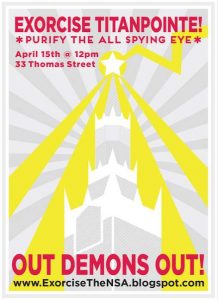

New York City Titanpointe National Security Agency Protest
There is a massive 550 foot tall gray granite and cement NSA spying hub hidden in plain sight in a windowless skyscraper in downtown Manhattan. At noon on April 15 an action is planned by a group called the Quiet American. It is an arts and politics journal based in Ridgewood, Queens, New York. They will perform a rite of exorcism on the building in order to, as their press release states, “to metaphysically purge the edifice of the data it hoards and to invoke a less maniacal version of citizen-government relations.”
The building is located at 33 Thomas Street where the action will take place. It is a windowless monolith that people say is “creepy as hell” and “a monument to the bottomless fear that locks us in permanent war”. The building was designed to withstand a nuclear assault and sustain its employees working there for two weeks.
Guest – Eli Smith, a musician and activist from Brooklyn, who has helped organize the event. Eli Smith is also a folklorist and music producer who organizes the annual “Brooklyn Folk Festival”, a huge weekend music gathering now in its ninth year, and coming up at the end of April.
—-
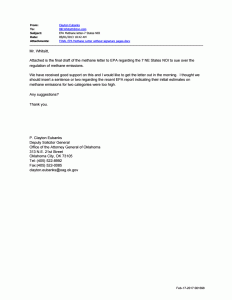

Lawsuit Forces EPA Head To Release More Emails Exposing Fossil Fuel Ties
Donald Trump’s nominee to head the Environmental Protection Agency, Scott Pruitt, was recently sued by the Center for Media and Democracy to force the release of emails exposing ties with fossil fuel backers and the Oklahoma Office of Attorney General.
The suit, filed on behalf of the Center for Media and Democracy (CMD), seeks an emergency injunction to prevent Pruitt from destroying any documents relevant to the group’s open records requests before his confirmation hearing. Since 2015, CMD filed seven records requests with Pruitt’s office seeking communications with Koch Industries and other coal, oil, and gas corporations as well as the corporate-funded Republican Attorney General’s Association.
Pruitt has yet to turn over a single document, despite acknowledging that his office has 3,000 emails and other documents relevant to CMD’s initial request. The Oklahoma Open Records Act provides that “the people are vested with the inherent right to know and be fully informed about their government . . . so they may efficiently and intelligently exercise their inherent political power.”
The act also mandates that a public body “must provide prompt, reasonable access to its records.” With Pruitt seeking confirmation to become EPA administrator, these public records are essential for the U.S. Senate to do its job.
“There is no valid legal justification for the emails we received last night not being released prior to Pruitt’s confirmation vote other than to evade public scrutiny,” said Arn Pearson, general counsel for CMD. “There are hundreds of emails between the AG’s office, Devon Energy, and other polluters that Senators should have been permitted to review prior to their vote to assess Pruitt’s ties to the fossil fuel industry.”
Guest – Arn Pearson, General Counsel and Policy Advisor from the Center for Media and Democracy. He previously served as the Vice President for Policy and Litigation at Common Cause. Arn has worked for more than 20 years developing federal and state policy and legal strategies around campaign finance reform, government ethics, corporate accountability, and tax reform.
————————————————————-
CIA Sponsored Terror, Civil Liberties, Criminalizing Dissent, Cuba, Gaza, Human Rights, Prison Industry, Torture, Truth to Power, War Resister
Podcast: Play in new window | Download

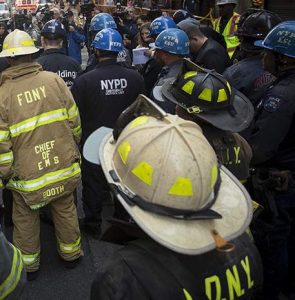
More FDNY Lawsuits
Two years ago the New York Fire Department settled a racial discrimination suit brought by the Center for Constitutional Rights and the United States Department of Justice on behalf of the Vulcans, black fire fighters organization. The court awarded $100 million in back pay and benefits to fire fighters who had been discriminated against and to applicants who’s efforts to join the department had been stymied by what the court ruled was institutional bias. Two weeks ago a second lawsuit was filed by Brooklyn attorney Greg Smith on behalf of 10 African American civilians who work in the non-uniform part of the New York Fire Department. The suit alleges pay discrimination, retaliation for complaints, and harassment of black people working at the fire department.
Guest – Ginger Adams Otis has been writing about New York City and local politics for more than a decade. She is a staff writer at the NY Daily News. Otis started covering City Hall and the Fire Department when she worked for The Chief-Leader, from there she moved to staff position at the NY Post. She’s also been a radio and print freelancer for WNYC, the Associated Press, BBC, National Public Radio, The Village Voice and national magazines such as The Nation and Ms. She lives in Harlem, NY.Ginger Otis. She’s the author of the book Firefight The Century-Long Battle to Integrate New York’s Bravest. Ms. Otis works as a staff writer for the NY Daily News.
—-
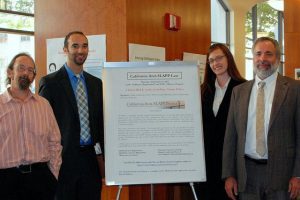

Anti-SLAPP Legislation
If you have ever left a less than favorable comment on a website such as Yelp or TripAdvisor you should know that some businesses or doctors are suing consumers for their negative reviews. Patients writing about botched surgical procedures or doctors’ billing practices have been sued in small claims court saying the bad reviews cost their practices thousands of dollars.
Two pending federal laws are designed to protect consumers from legal retaliation when they express opinions online.
The Consumer Review Fairness Act, dubbed the “Right to Yelp Act,” would bar companies from including gag clauses in agreements they ask consumers to sign. And the Speak Free Act would create a legal weapon for defendants in lawsuits over their publicly expressed thoughts. Such cases are called SLAPP (strategic lawsuits against public participation). Someone brought into court over their words can invoke the bill’s anti-SLAPP motion to get the case dismissed quickly and force the plaintiff to pay attorney’s fees.
Yelp is among some 40 companies and nonprofits backing the bills, which also have bipartisan support in Congress, where they are expected to move forward this fall. Some, however, find the bills unconstitutional as they might impose barriers to civil rights and public interest litigation.
Guest – Evan Mascagni, policy director at the Public Participation Project. The Project assists individuals and organizations working to pass anti-SLAPP legislation in the states while educating the public regarding SLAPPs and their consequences.
—-
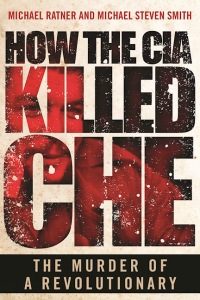
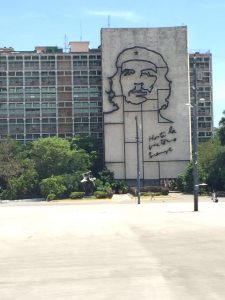
How the CIA Killed Che: The Murder of A Revolutionary
The Cuban revolution of 1959 was a historical turning point. It ended American corporate and political control of the island’s economy and government and it demonstrated to other Latin American and Caribbean peoples that they could do the same. The American response was quick and deadly. They overthrew any governments that did not oppose the Cuban revolution. This included Brazil, Argentina, the Dominican Republic, Bolivia and most spectacularly, in 1971, in an effort involving US Secretary of State Henry Kissinger, the democratically elected socialist government of Chile. Che Guevara failed in his attempt to defend the revolution in Cuba by extending it. He started in Bolivia with a band of international revolutionary guerrilla fighters and was quickly discovered, surrounded, and assassinated by Bolivian soldiers trained and organized by the CIA in an operation that was directed right out of the White House. The economic blockade of Cuba by the United States is still in effect. Left leaning governments in Argentina, Brazil, and Honduras have been replaced by neoliberal capitalists under the favored hand of the American government.
Guest – Professor Greg Grandin wrote the introduction to the recently published book by our own Michael Ratner and Michael Steven Smith called “How the CIA Killed Che. Grandin is the author of a number of prize-winning books, including most recently “The Empire of Necessity: Slavery, Freedom, and Deception in the New World,” which won the Bancroft Prize in American History and was shortlisted for the Samuel Johnson Prize in the UK. NPR’s Maureen Corrigan on Fresh Air named The Empire of Necessity as the best book of 2014, both non-fiction and fiction. “Fordlandia: The Rise and Fall of Henry Ford’s Forgotten Jungle City” was a finalist for the Pulitzer Prize in History, as well as for the National Book Award and the National Book Critics Circle Award and was picked by the New York Times, New Yorker, Boston Globe, Chicago Tribune and NPR for their “best of” lists, and Amazon.com named it the best history book of 2009.





























